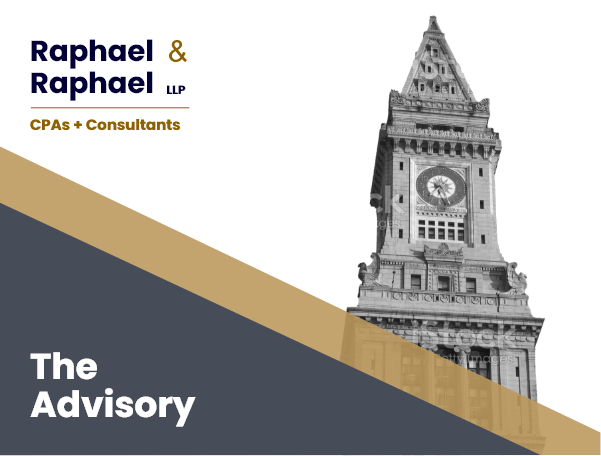
Newsletter
2020 Q4
Welcome to the inaugural Raphael and Raphael newsletter, The Advisory. We wish you and your family a happy and healthy holiday season. In this edition, and those to come, we will present timely tax and accounting advice to help you prepare for coming changes, and remind you of important filing deadlines. Since this is an excellent time to enact planning strategies for the 2020 tax year, we have included an article on that subject, as well as an overview of President-Elect Biden’s tax plan, and how to navigate the federal stimulus programs around COVID-19.
Unique 2020 Year-End Tax Planning for Individuals and Businesses
This year, everyone can take advantage of the charitable contribution deduction. You can deduct up to $300 in contributions regardless of whether you itemize or take the standard deduction. For itemizers, the deduction limit has been increased from 60% to 100% of your adjusted gross income (AGI). This applies only to cash donations made to public charities.
Many business owners will qualify for the 20% qualified business income (QBI) deduction. This includes self-employed individuals, as well as certain S Corporation shareholders, partners in partnerships, and members in LLCs. We can help you determine your eligibility and discuss strategies for further reducing taxable self-employment income.
For many businesses, 2020 income has not kept pace with expectations. If you’ve experienced losses this year, filing your return quickly may return cash to aid your recovery during 2021. Additionally, recent corrections allow accelerated depreciation on non-residential building Qualified Improvement Property placed in service since September 27, 2017. This may make amending prior year returns an effective way to generate cash refunds.
We encourage our clients to revisit their fourth quarter tax estimates, due January 15th, 2021, to avoid paying estimates that provide no benefit. We’d be glad to review your 2020 tax situation for these unique opportunities for tax savings and improving tax-related cash flow.
Walking Through President-Elect Biden’s Tax Plan
Understanding President-Elect Biden’s proposed tax plan will be key to tax planning for the next few years, especially with runoff elections poised to determine the Senate majority.
For individuals making over $400,000, the tax plan calls for limiting the tax benefit of itemized deductions. Setting up a donor-advised fund for large charitable contributions can help you maximize your benefit before any new limitations. The plan also calls for an expansion of the 12.4% social security tax on wages in excess of the $400,000, split between employer and employee.
Additionally, we want to highlight the planned reduction of the gift tax exemption from the current $11.5M down to $3.5M. If you are considering a large gift, it would be prudent to make it while the larger threshold still applies. Combined with the return of the previous higher estate tax rates, you should contact us to discuss potential updates to your estate planning.
Navigating COVID-19 Stimulus Programs
COVID-19 related stimulus programs are intended to provide relief to businesses and employers. Often, however, their complexity provides more headaches than relief. Please be mindful of the following programs as you navigate these stimulus programs:
FFCRA and CARES Act Tax Credits. The Families First Coronavirus Response Act (FFCRA) and CARES Act provide eligible employers fully refundable tax credits related to FFCRA-mandated leave wages and employee retention during full or partial suspension of business, respectively. Employers, including those that are self-employed, who have not yet claimed any tax credits under these acts may claim them retroactively on qualified wages.
Deferral of Employee Social Security Taxes Under the CARES Act. This act allows businesses to postpone deposits of their share of social security taxes due through December 31, 2020. These deferred deposits will need to be 50% paid by December 31, 2021, and 100% paid by December 31, 2022, which should be considered when planning your future cash flows during the next two years.
Paycheck Protection Program (PPP) Loan. If you received a PPP loan, be sure to thoroughly document your usage of the funds so you can substantiate the amount subject to loan forgiveness. We also encourage you to review the covenants included in any of your existing debt agreements to estimate the impact of the additional debt from the PPP loan. If it could cause a technical default, we can work with you and your lender to discuss remedy options including accelerated repayments or a waiver from the lender.
Economic Injury Disaster Loan. If you received this loan from the Small Business Administration, make sure you understand and are up to date with the covenant requirements set forth in the related debt agreements.
Big firm expertise. Small firm relationships.
For more information about Raphael and Raphael LLP, or to sign up for our free newsletter, please reach out today.
Copyright © 2022 Raphael and Raphael LLP. All rights reserved.
52 Church Street, Boston, MA 02116